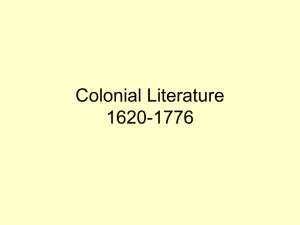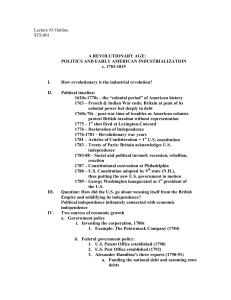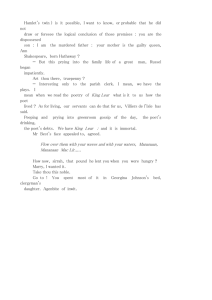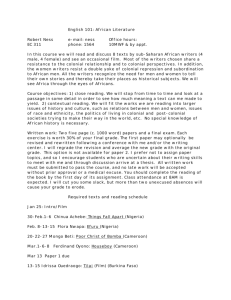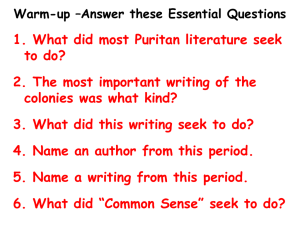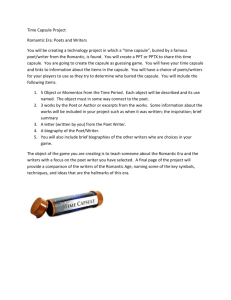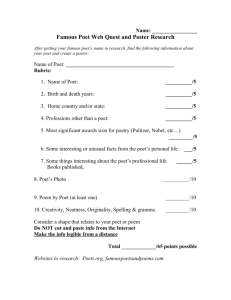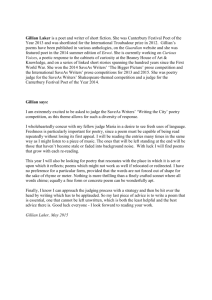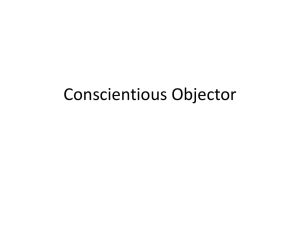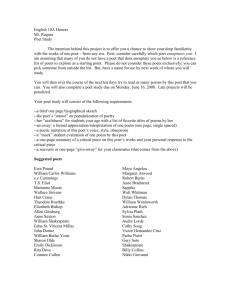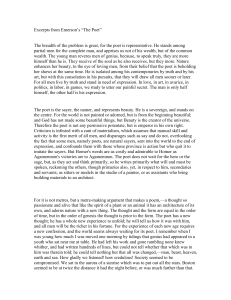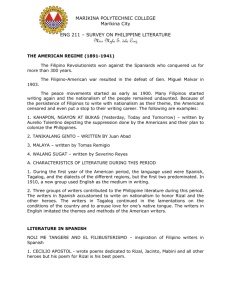American Literature Periods & Movements Overview
advertisement
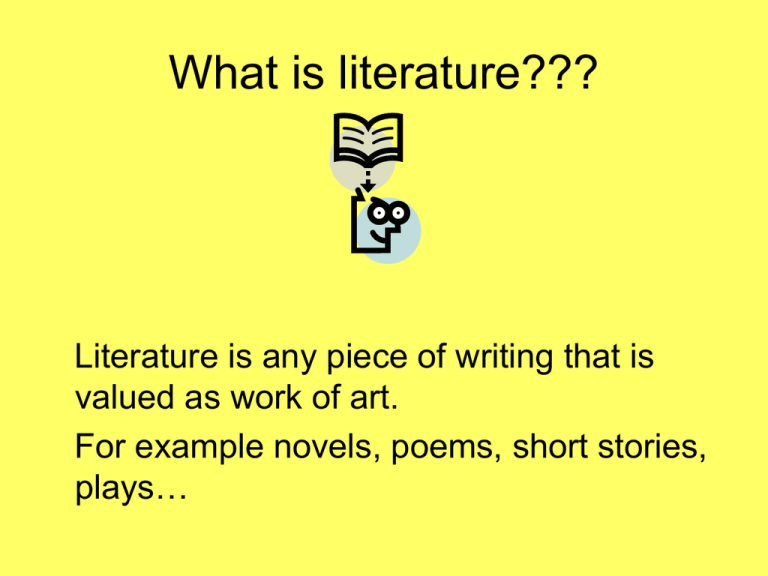
What is literature??? Literature is any piece of writing that is valued as work of art. For example novels, poems, short stories, plays… American Literature • • • • • • • • • • • • Colonial Period (1607-1775) Revolutionary Period (1775-1789) Romantic Period (the 19 century) Realism (since the 1860s) Lost Generation (the 1920s, 1930s) Literature between the World Wars (1918-1939) Beat Generation (the 1950s) Modern Literary Movements (since 1945) Afro-American Literature Jewish Literature Ethnic Literature American Drama Colonial Period The literature of this period was strongly influenced by religion of the authors (Puritanism) and was often informative of how to survive in the wild, uncivilised country. Sometimes the texts were just descriptions of the hard life and colonisation process in America of the 17th century. Writers of Colonial Period Descriptive and biblical literature: • Capt. John Smith • Cotton Mather • William Bradford Poetry: • Anne Bradstreet • Edward Taylor Revolutionary Period This period was marked by the War of Independence. 4 July 1776 – Declaration of Independence 1777 – Battle at Saratoga (the first victory over the British) 1781 – the end of the war 1783 – Britain recognizes the USA as a sovereign state 1789 – the U.S. Constitution comes in force 1789 – G. Washington becomes the first U.S. president Literature of Revolutionary Period - merely political character - pamphlets, essays, declarations, speeches etc. • Thomas Jefferson (Declaration of Independence) • Benjamin Franklin (Poor Richard´s Almanach) From the War of Independence to the Civil War (1789-1861) • Shifting the frontier westbound (pioneers) • Growing self-awareness, pride and patriotism • The period of slavery • The beginning of American Romantism Literature of the period (1789-1861) • Harriet Beecher Stowe (Uncle Tom´s Cabin) • Washington Irving (Life of George Washington) • James Feninmore Cooper (The Last of the Mohicanes, The Pioneers, The Prairie, The Pathfinder, The Deerslayer) • Ralph Waldo Emerson – Transcedentalist Movement; the greatest essayist (The American Poet, The Friendship…) • Nathaniel Hawthorne (The Scarlet Letter) • Herman Melville – a symbolist (Moby Dick) • Edgar Allan Poe (The Raven, The Pit and the Pendulum, The Black Cat, The Fall of the House of Ushers) • Walt Whitman (O Captain! My Captain! , Leaves of Grass – written in free verse) • Emily Dickinson – mentally ill, lived worked and died in Amherst (Bolts of Melody) The Gilded Age - Realism, „Local Color“, American Humour • Mark Twain (Life on Mississippi, The Adventures of Huckleberry Finn and Tom Sawyer, The Prince and the Pauper,…) • Henry James (Washington Square, Daisy Miller) • Edit Wharton (The Age of Innocence) • Jack London – Naturalist (The Call of the Wild, The Sea-Wolf) • Theodore Dreiser (An American Tragedy) • Sherwood Anderson (Winesburg, Ohio) Literature between the Wars • The Lost Generation (e.g.E.Hemingway, Francis Scott Fitzgerald, John Dos Passos, William Faulkner) • Robert Frost – a poet (New Hampshire) • Carl Sandburg – a realistic poet (Good Morning, America) • e.e.cummings – an experimental poet Modern American Literature • Henry Miller – a guru of hippies (Sexus, Plexus, Nexus) • Ray Bradbury (Fahrenheit 451) • Norman Mailer (The Naked and the Dead) • Jack Kerouac (On the Road, Lonesome Traveler) • Williams Boroughs (The Naked Lunch) • William Styron (Sophia´s Choice, The Long March) • Truman Capote (In Cold Blood) • E.L.Doctorow (Ragtime) • Allan Ginsberg – a guru of the Beat Generation (Kaddish and Other Poems) • Lawrence Ferlinghetti (A Coney Island of the Mind) • Gregory Nunzio Corso (The Happy Birthday of Death) • Jewish writers: Bernard Malamud, I.B.Singer, Saul Below, Philip Roth, Jerome David Salinger, Joseph Heller • Black writers: James Langston Hughes, LeRoi Jones (Amiri Baraka), James Baldwin, Toni Morrison, Alex Haley American Theatre • Eugene O´Neil (The Emperor Jones, Desire Under the Elms) • Tennesee Williams (A Streetcare named Desire, Glass Menagerie) • Arthur Miller (Death of a Salesman)
